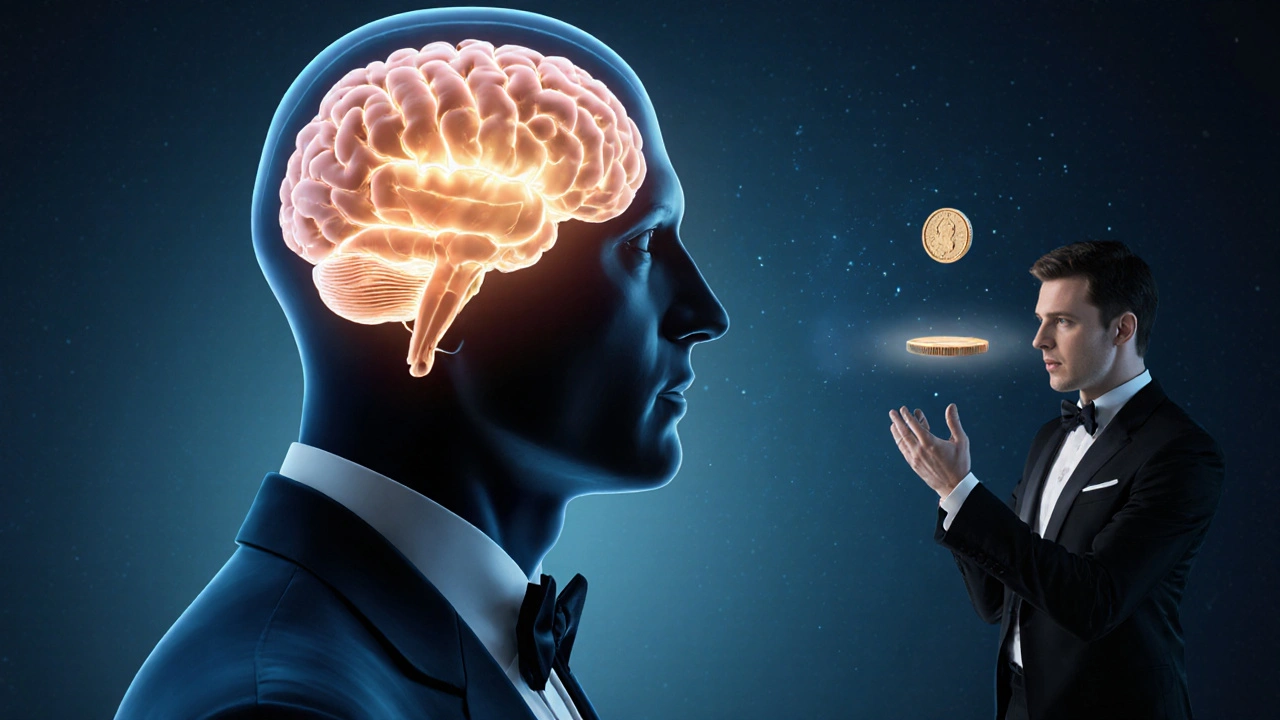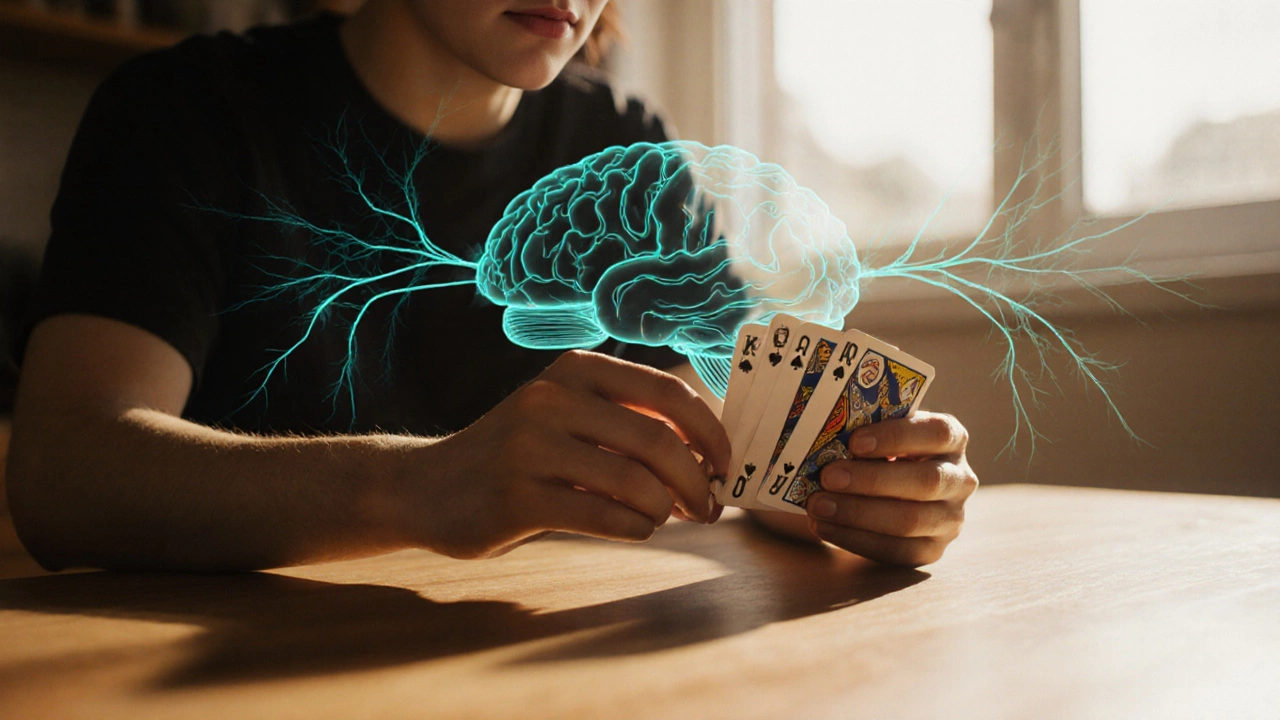Cognitive Boost Calculator
How Much Brain Improvement?
Calculate your potential cognitive gains from practicing magic tricks. Based on research showing 10-20% improvements in key brain functions.
When you think about magic tricks are performances that create the illusion of impossible feats, using techniques like misdirection, sleight of hand, and psychological subtleties, you probably picture a rabbit out of a hat. But beyond the wow factor, these tricks double as a surprisingly effective brain workout.
Why Magic Tricks Are Good Brain Exercise
Every time you plan a trick, you juggle several mental tasks at once: remembering a sequence, timing a move, and anticipating the audience’s attention. This multitasking mirrors what Cognitive psychology studies as executive function, the brain’s command center for planning and coordination. By repeatedly exercising these pathways, you strengthen neural connections that help with everyday problem solving.
The Science Behind Illusion and Cognition
Neuroscientists have mapped the brain regions lit up during magic performances. Neuroscience research shows that misdirection triggers the parietal lobe, which processes spatial awareness, while the prefrontal cortex lights up when you keep a secret move hidden from yourself.
In a 2023 study from the University of California, participants who practiced a simple card‑force for two weeks improved their memory retention scores by 12% compared to a control group.
Key Brain Skills Strengthened by Magic
Below is a quick snapshot of the mental muscles you work out each time you pull a coin from behind an ear.
| Brain Skill | Magic Technique | Typical Improvement |
|---|---|---|
| Attention | Misdirection | +15% focus duration |
| Working Memory | Sleight of hand sequences | +10% recall accuracy |
| Problem Solving | Designing new routines | +20% creative thinking |
| Pattern Recognition | Card forcing | +12% speed of spotting patterns |

Simple Tricks You Can Try Today
Nothing fancy needed-just a deck of cards and a willingness to practice. Follow the steps, and you’ll feel your mind stretching.
- Shuffle the deck while keeping the top card in mind. This builds working memory and hand‑eye coordination.
- Perform the classic "self‑working" card force: ask a friend to pick any card, then reveal it matches the one you predicted. The mental load of tracking the force improves attention.
- End with a “vanish” of a small object (a coin). The rapid motion trains problem solving as you figure out the most efficient grip.
Creating Your Own Routine: Tips for Practice
To keep the brain challenge fresh, vary the difficulty and the type of illusion.
- Mix techniques: combine misdirection with sleight of hand in a single routine to force your brain to switch contexts.
- Set a timer: aim for 10‑minute focused practice sessions. Short bursts are better for neuroplasticity than marathon sessions.
- Record yourself: watching playback highlights where your attention slipped, giving you concrete data to improve.
- Teach a friend: explaining the method forces you to reorganize knowledge, a proven method for long‑term retention.
Common Pitfalls and How to Avoid Them
Even enthusiastic beginners hit snags. Here’s what to watch out for.
- Rushing the move - Speed without precision confuses the brain rather than trains it. Slow down, then speed up gradually.
- Skipping the story - Magic is as much narrative as technique. Forgetting the storyline reduces the cognitive load of problem solving.
- Neglecting rest - Neuroplastic gains happen during rest. Take short breaks after each practice block.
Resources and Next Steps
Ready to dive deeper? These resources keep the mental gains rolling.
- The Psychology of Magic (book, 2022) - explores how illusion tricks the brain.
- Online course “Magic for Cognitive Development” - 8‑week video series with weekly challenges.
- Mobile app “BrainDeck” - tracks your practice time and suggests new tricks based on your skill level.
In short, magic tricks aren’t just party tricks; they’re a portable brain‑gym you can carry in your pocket. Pick a card, master a flourish, and watch your mental muscles grow.
Can magic tricks really improve memory?
Yes. The act of remembering secret moves, sequences, and audience cues engages working memory. Studies show regular practice can boost recall accuracy by up to 12%.
What age group benefits most from magic‑based brain training?
Both children and adults see gains, but kids aged 8‑12 experience the steepest improvement in attention span because their brains are still highly plastic.
Do I need expensive props to start?
No. A simple deck of cards, a few coins, and a bit of imagination are enough. The cognitive benefit comes from the mental steps, not the flashiness of the props.
How often should I practice for optimal brain gains?
Aim for 10‑15 minute focused sessions 3‑4 times a week. Consistency beats occasional marathon sessions for neuroplastic growth.
Can magic tricks help with anxiety?
Yes. Performing tricks requires presence and controlled breathing, which can reduce stress. The focus on the audience also shifts attention away from anxious thoughts.


Nicholas Zeitler
October 22, 2025 AT 04:30Wow!!! This article really shows how a simple card‑force can become a full‑blown brain workout!!!, you're right, practicing misdirection sharpens attention, and the sleight‑of‑hand sequences boost working memory!!! Keep it up, and don't forget to log your practice sessions!!!
Teja kumar Baliga
October 22, 2025 AT 18:23Magic tricks are a cool shortcut to sharpen focus while having fun.
k arnold
October 23, 2025 AT 08:17Sure, because everyone’s just dying to replace their morning coffee with a deck of cards-what could possibly go wrong? The “12% memory boost” sounds like marketing fluff, and let’s be honest, most of us can’t even keep track of our keys, let alone a secret move. Still, if you enjoy waving cards around, go for it.
Tiffany Ho
October 23, 2025 AT 22:10Nice job sharing these tips it is easy to start with a simple deck and see real improvement you will feel more focus as you practice regularly keep it up
michael Melanson
October 24, 2025 AT 12:03I tried the coin vanish trick last night and it really forced me to think about my hand positioning it was a good mini workout for my brain thanks for the guide
lucia burton
October 25, 2025 AT 01:57Alright, let’s dive deep into the mechanistic underpinnings of why magic is practically a neurocognitive boot‑camp. First, every sleight forces the practitioner to toggle between procedural memory and declarative recall, a dual‑system engagement that is rarely achieved in standard rote study.
Second, the constant need for temporal precision activates the cerebellar‑striatal loops, thereby enhancing motor sequencing fidelity.
Third, misdirection leverages attentional capture, recruiting the dorsal attentional network and sharpening selective focus.
Fourth, concealing a move from yourself invokes metacognitive monitoring, a prefrontal operation linked to higher‑order executive function.
Fifth, designing original routines compels divergent thinking, which in turn expands the functional connectivity of the default mode network.
Moreover, the stress‑induced arousal during performance releases moderate levels of norepinephrine, a neuromodulator known to facilitate long‑term potentiation.
Practically, a 10‑minute daily drill can produce measurable gains in working memory span, as evidenced by the 12% improvement cited in the UC study.
From a plasticity standpoint, repeated practice drives synaptic pruning of inefficient pathways while reinforcing the most efficient routes, resulting in faster pattern recognition.
In addition, teaching a trick to a peer forces the learner to verbalize the process, solidifying procedural schemas into declarative knowledge.
Finally, the embodied cognition aspect-using hands to manipulate objects-grounds abstract concepts in sensorimotor experience, a principle championed by modern cognitive science.
All told, magic isn’t just entertainment; it’s an applied cognitive training protocol that ticks off many of the criteria for an effective brain‑gym.
Denise Young
October 25, 2025 AT 15:50Oh, absolutely, because who needs a PhD in neuroscience when you can pull a rabbit out of a hat and claim you’ve just upgraded your prefrontal cortex? The jargon‑laden breakdown above reads like a corporate PowerPoint, yet the underlying truth is simple: moving cards around can make you feel smarter, at least for a few minutes before you forget where you put the deck.
That said, the real value lies in the habit‑forming loop-practice, fail, iterate, repeat-and that loop is the same engine that powers any skill acquisition, magic or not.
So, while the numbers sound impressive, remember that the 12% boost is a group average; individual variance can be huge, and some people might see no change at all.
Nevertheless, if you enjoy the theatrical flair, the slight neuro‑boost is a nice bonus, not a miracle cure.
In short, keep the tricks fun, keep the practice consistent, and maybe, just maybe, you’ll notice a subtle edge in daily problem‑solving.
Sam Rittenhouse
October 26, 2025 AT 04:43The dramatic flair you described really captures the essence of why magic feels like mental gymnastics. By weaving narrative into each move, you engage emotional memory circuits, which makes the learning stick longer. Also, the emphasis on breath control during performance can act as a natural stress‑reliever, complementing the cognitive gains. Keep channeling that theater vibe-it turns a simple trick into a holistic brain‑training session.